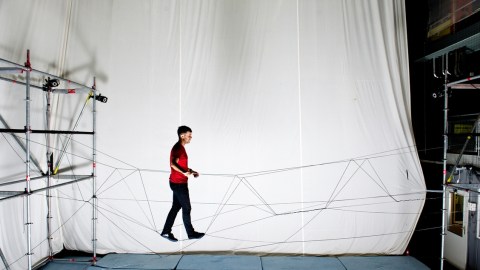Drones Will Become the Architects of Our World

Would you cross a bridge if you knew it had been built by drones? Researchers at the ETH Zurich Flying Machine Arena have succeeded in programming a group of drones to autonomously assemble a rope bridge strong enough for three humans to cross without incident.
The purpose of this project is to show for “first time that small flying machines are capable of autonomously realizing load-bearing structures at full scale and proceeding a step further towards real-world scenarios.”
The project wasn’t without issue; researchers had to deal with the drone’s limited payload capacity. So they settled on using a rope material known as Dyneema, which has a low weight-to-strength ratio. Motorized spools were attached to the bottom of the drones, allowing them to control for tension when wrapping and weaving the structure.
One piece of the bridge was constructed by humans: the two steel scaffolds. These structures provided an anchor for the drones to work off of from an algorithmic standpoint. Before the drones began weaving the bridge, the researchers had to input environmental anchor points into the system. From there, the drones were able to take over without human intervention and construct a rope bridge.
Would you cross a bridge if you knew it had been built by drones?
The end result was a structure “[s]panning 7.4 m between two scaffolding structures; the bridge consists of nine rope segments for a total rope length of about 120 m and is composed of different elements, such as knots, links, and braid.”
It’s both an exciting and frightening time for drone advancements. There’s no doubt that the future will be filled with drones. It’s just a question of whether we’ll hear more stories about how they will improve delivery of our packages, advance whale research, and bring Internet to the third world; or if they’ll be more about conflicts over invasion of privacy and strikes against enemy states.
—
Natalie has been writing professionally for about 6 years. After graduating from Ithaca College with a degree in Feature Writing, she snagged a job at PCMag.com where she had the opportunity to review all the latest consumer gadgets. Since then she has become a writer for hire, freelancing for various websites. In her spare time, you may find her riding her motorcycle, reading YA novels, hiking, or playing video games. Follow her on Twitter: @nat_schumaker
Photo Credit: ETH Zurich





